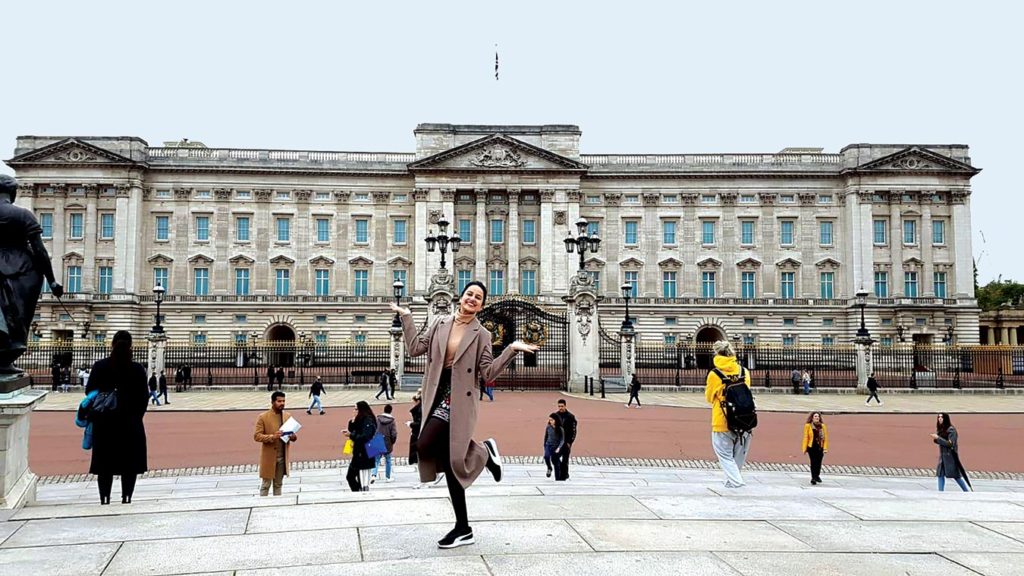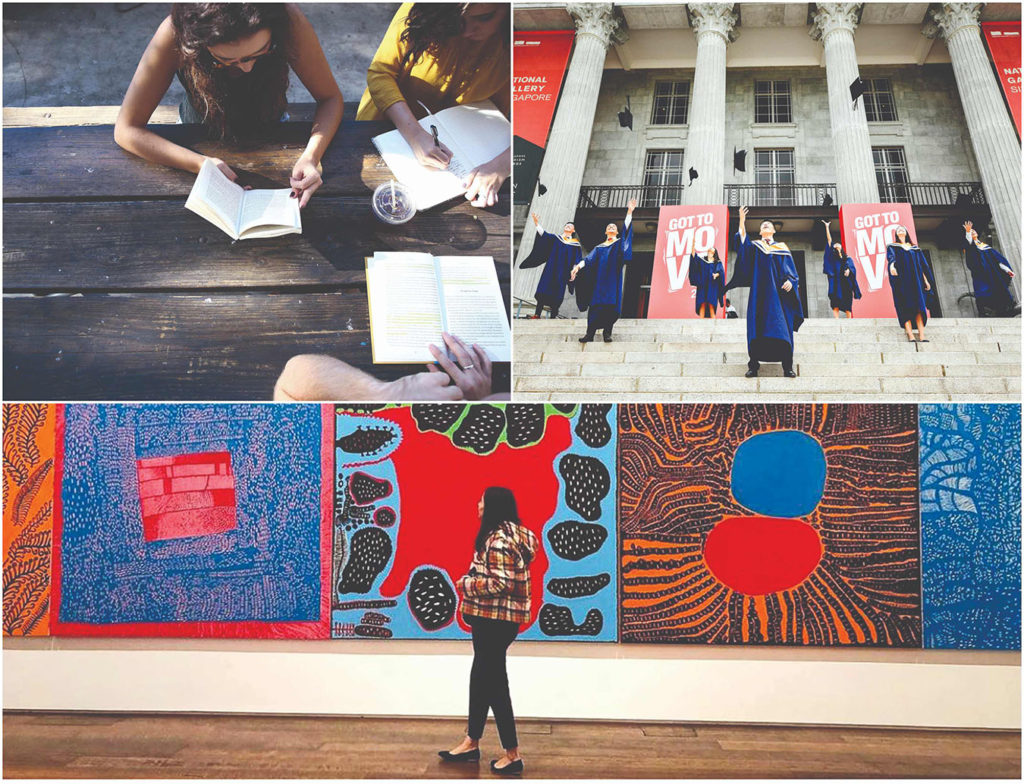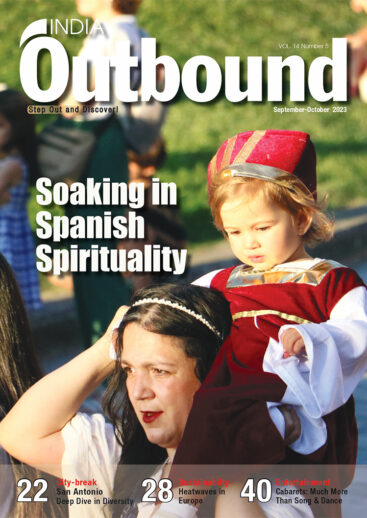
Each year, nearly a million Indians leave for about 50 nations to take up diverse fields of education
“You have certain expectations when you come to a cosmopolitan metropolis like London. I, too, had my expectations of experiencing a vibrant student life on campus in London. However, due to the pandemic, various rules and safety protocols like social distancing are in place and this has changed the entire student life experience,” Sristi Gautam, a 25-year-old resident of Kolkata who reached London in August to join London School of Economics to pursue LLM in Human Rights Law tells India Outbound.
Gautam goes on to say that if she had her way, she would have preferred to come to London and join her studies at a time when the pandemic wasn’t around and life was normal. But as she had already missed joining her course last year despite being admitted, she could not afford to sit out another year, hoping that things may be back to normal.
Indeed, with new regulations governing the organisation of classes as well as severely restricted access to common but necessary facilities like the library, the life on the campus is not at all what students like Gautam expected it to be. “Our interactions with fellow students are severely curtailed. Also, a lot of campus events meant to be in person have been cancelled or held online and even our seminars and other classroom events have mainly become online, so a lot of the charm of studying on the campus is missing,” adds Gautam.
Echoing Gautam, Divyank Jain, a student at London’s City University says that the studies were not hampered but the feel of being on the campus was missing. “My university was not totally closed. Classes were taking place online, most of them but we were allowed to go to the library and study there in a few days. Everything was sanitised, cleaned up, with social distancing, masks and all the required safety precautions, but we were still allowed inside the campus for studying, using the labs or sitting in the library,” says Jain, who chose to stay on in London even when the city went under a lockdown earlier this year.

Gautam says that she would have preferred to come to London and join her studies at a time when the pandemic wasn’t around and life was normal
Jain says proper planning was one of the main reasons behind the continuity of education despite the complete disruption of life outside the campus. “I think it was better planning from the university authorities’ side that they understood that there are many of us who have stayed back and want to continue with studies normally. They didn’t let us down. Teachers were available and we had the option of choosing an online mode too,” he says.
“Going out on projects, talking to people, going out for a couple of parties and meeting new people is a part of what I used to do very often here. That totally stopped. Basically, degrees were not hampered and studies were not hampered but the experience of a different culture, a new society was,” says Jain who is a third-year student of business management.
Students turn explorers
In June, after over two months of a complete freeze of international air connections, when the Indian government finally allowed certain categories of Indians to leave India, students were high on the list. And since then, thousands of Indian students have already left to join or recommence their studies overseas.
Each year, nearly a million Indians leave for about 50 nations to take up diverse fields of education. They make up an important and rising chunk of the Indians travelling overseas and they are also increasingly important to the colleges and universities overseas as well as the economies of the countries which they choose for continuing their higher studies.
Over the past decade, a number of countries have begun mounting roadshows of their educational institutions in India, in an attempt to attract the highest number of students possible. And this year with their economies reeling under unprecedented distress due to the pandemic, many countries including France, United Kingdom, United States and Canada were quick to reopen their borders as well as visa services to foreign students joining universities in their countries.
As early as June, France announced the opening of its borders to all international students, including from India, starting July 1. “In August, France became the first country to open its consular services in India, exclusively for students and researchers travelling to France. Both these important steps were undertaken to ensure continuity of students’ education,” an official of CampusFrance India tells India Outbound.
Last year, approximately 10,000 Indian students chose France as their study destination. CampusFrance, the government body that promotes French educational institutions overseas, says that the pandemic and the subsequent lockdowns did impact a number of students travelling anywhere for their higher studies.
“The Embassy of France through the 12 CampusFrance offices in India has remained in contact with the student community and all scheduled interactions took place and were well received including the pre-departure session in August, the orientation sessions for PhD in September and the Choose France tour (which is the Higher Education fair) in November. These were organised online. Institutions in France have developed protocols and hybrid methods of teaching (on campus and online) to ensure the security of students,” says CampusFrance.

Students say they have been visiting key landmarks in their cities, partly to reduce the boredom of not being with a group of students
Temporary blip in numbers
Certainly, the number of Indian students going overseas for studies this year is down due to the pandemic. “The number of students travelling overseas this year is of course much lower than the previous years. The ones who were already enrolled, some of them are attending online courses and many countries like the United Kingdom have launched hybrid courses, which means only one or two classes per week in person and the rest online. So taking that into account, of course the number of students overseas is much lower and visas are still not being issued by all the countries, so that is why there is a decline in numbers this year,” says Jyoti Mayal, president of Travel Agents Association of India (TAAI), the largest association of travel trade in India.
CampusFrance believes that despite the parents’ concerns over health and safety of their children going overseas, it is only a matter of when not if students will begin travelling in big numbers again. “More than cancellations, it has been a case of postponement on account of a changed transportation and health scenario. Majority of students have held on to their plans for studying abroad either for the January 2021 or September session. This is also evident from the equivalent or higher number of students attending the different programmes and fairs on the subject,” says CampusFrance.
“Due to virtual classes, many students have dropped out this year and say they will start the course next year as they are not keen on doing virtual or online courses. They want to be present on the campus and in the country as that is an entirely different kind of experience, that is why you spend so much, you go out of your country,” says Mayal.
Mayal is backed up by Khwaish Jain, a 22-year-old student who is currently pursuing her graduation in actuarial science at London’s City University. “More than anything else, the whole point of studying abroad for long terms is to experience a whole new culture and feel the mixture of all cultures together. That is missing for most students right now. Our university was pretty easy going with academics. We already had attendance, work submissions and everything else online. So, the academic part has not changed much, as in we are not supposed to add in any new skill to cope up the study part, but most of the enjoyable parts of the living on your own, working, doing grocery shopping, cooking, and everything that skilled you as an individual is missing these days,” she says.

All stakeholders hope that things would improve dramatically in a few months from now & especially with a variety of vaccines against coronavirus available
Rosier picture for 2021
Practically all the stakeholders hope that things would improve dramatically in a few months from now and especially with a variety of vaccines against coronavirus available now. The colleges and institutions like CampusFrance, but most students, as well as travel agents, also believe that the situation would be much better in time for the next academic year. “I am planning to go back and continue my education for the masters there. But my parents are really scared of me travelling and living alone in a whole new country at this time due to the widespread infection and risks. They feel that even if I get infected, they can look after me when I am at home with them but they won’t be able to help me immediately if I fall sick while I’m not living with them,” says Khwaish Jain.
“The situation is much better now than what it was in July-August, in terms of departures for September semester. It has improved certainly, but it is not back to normal as it was in 2019. I expect the situation to be fully normal in time for the next academic year, for the September 2021 semester as by then most countries would have had access to the vaccines,” says Mayal.
Riddhi Roy of Dolphin Travel, a Kolkata-based travel agent, also believes that the fear of travel has declined. “Yes, it has become a lot better. The standard operating procedures for passengers and airlines are clearer. Panic and fear have gone down. The number is increasing. So, it is a lot better compared to what it was,” says Roy.
Costs climb out of control?
One of the biggest casualties of the Covid-19 pandemic has been the global economy and hence keeping a tight lid on expenses is the mantra for almost everyone around the globe. For the students going overseas for studies this year, it has been a mixed picture so far. TAAI’s Mayal says that for most of the things, the costs have remained the same. “The costs for students who have gone or who plan to go soon have not risen at all. Prices of some of the things that were on the higher side even before the pandemic have remained there. So it is not that someone has hiked up prices due to Covid-19 pandemic. The ticket fares are not high at all,” she says.
CampusFrance says the educational institutions in France have not raised the fees, which are anyway heavily subsidised. “There has been no increase between 2019 and 2020 for students’ fees in public institutions. In fact, most of the higher education is subsidised by the taxpayer in France and therefore the cost passed on to the students is marginal,” it adds.
However, some others do complain of much higher costs this year, many of the increases due to the prevailing situation. “I don’t know the exact cost but overall it was quite expensive. We had to book a flight from Kolkata to Hyderabad since there were no direct flights to Singapore from Kolkata. Flight fares were almost thrice the normal value. We had to stay at a hotel to wait for the Hyderabad-Singapore flight. We had to pay a fee for SHN and a swab test, even though this was reduced for students. All this increased the expenses,” says Tanya Banerjee, a 19-year-old who left in September to join Singapore’s NTU for a bachelor’s degree in computer science.
Roy of Dolphin Travels also agrees that overall costs have increased for the passengers. “ Comparatively cost was higher. Air tickets were really high as there were limited flights flying,” she says.
Khwaish Jain says she had to take many steps to keep her costs under control as London is anyway one of the most expensive cities in the world. “Living in the central part of London is itself a very costly affair but during the lockdown, it added to more burden. Earlier, we would go out in groups, buy essentials in groups and get more discount on everything. It is not the case anymore. It is uncertain that for how long the restrictions are going to be in place and hence, I moved to spending for one day at a time. I stopped buying or ordering things in bulk, which of course resulted in spending more money on everyday things,” she says, adding that she also shifted her residence out of central London to save some money.
Exploring beyond campus
With classes moving online entirely, many students found themselves often with more time on their hands and made the most use of that – in exploring the city beyond their campus walls, the fear of contracting the pandemic notwithstanding. Students say they have been visiting most of the key landmarks in their cities, partly to reduce the boredom of not being with a group of students or on the campus.
“My winter break has begun now so I am exploring the city and I have been to Gardens by the Bay, Jurong Point mall, Takashimaya mall and Little India. It’s been exciting to explore with my friends. The MRT is very convenient and easy to use. We found people to be very polite and helpful but also busy with their own lives. The city is well planned and organised,” says Banerjee.
“It goes without saying that I am in the city of my dreams and the dream would be left unfulfilled if I didn’t explore it to every creek and corner. I have covered all the popular places in central London including the Buckingham Palace, the Tower Bridge, St. Paul’s Cathedral, Hyde Park, National Museum, Big Ben, London Eye, Westminster Abbey, Oxford Street, Borough Market, Greenwich, Canary Warf, Camden Town, Notting Hill and the list is extensive. All of these have their own historical references and are well preserved for obvious reasons. It certainly is an absolute delight to visit such places and reserve it deep in the corners of my memory,” says Gautam.





















